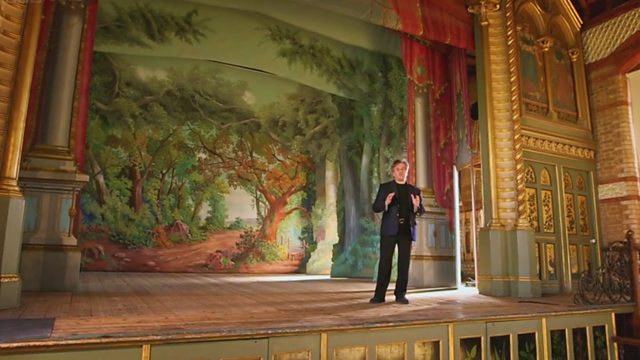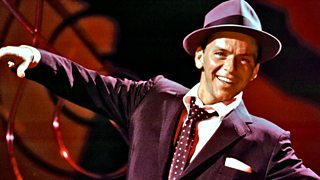
Soprano
Antonio Pappano explores the great roles and the greatest singers of the last 100 years through the prism of the main classical voice types. He begins with the soprano.
Series in which conductor Sir Antonio Pappano explores the great roles and the greatest singers of the last 100 years through the prism of the main classical voice types - soprano, tenor, mezzo-soprano, baritone and bass. Through discussion, demonstrations and workshops, Pappano explores every aspect of the art of great singing.
Behind every great voice is not just a rock-solid technique, but also a unique personality. As well as specially shot interviews and workshops with stars such as Jose Carreras, Anna Netrebko, Jonas Kaufmann, Joyce DiDonato, Bryn Terfel, Juan Diego Florez, Christa Ludwig, Thomas Allen, Felicity Palmer, John Tomlinson and Sarah Connolly, Pappano examines key performances from some of history's great operatic icons - Enrico Caruso, Maria Callas, Joan Sutherland - as well as those of singers from the more recent past, such as Luciano Pavarotti, Jon Vickers, Peter Pears and Janet Baker.
Antonio explores such topics as what is going on in a singer's body to produce a great voice; how one 'projects' a BrΓΌnnhilde over large orchestral forces; whether great singers also need to be great actors; what is vibrato, legato, staccato; what are chest and head voices - how do they work and when does one use them? He examines passaggio, colorature and support, and shows why a tenor's high C hits can pin you to the back of your seat.
He begins with the soprano - at the heart of nearly every opera, although she isn't always alive come the final curtain. Tragic heroines, warriors, feisty servants, divas - the soprano sings some of the most fabulous roles in opera. But while the prima donna may suffer on stage, she doesn't suffer fools off it. The great sopranos have always been larger-than-life characters, adored by their public and, in the case of Maria Callas, famous far beyond the opera house, her private life of as much fascination to the press as her singing.
But how does the soprano carry off these vocally and dramatically demanding roles? How does the body work to produce the sound, and what techniques are at play? How do you make yourself heard up in the gods if you're competing with a huge orchestra? What is going on in a soprano's throat, indeed her whole body? How does she sing coloratura? What effect does vibrato have on us, the listeners?
To find out, Pappano looks in detail at performances from some of the legendary sopranos of the modern era - Maria Callas, Joan Sutherland, Birgit Nilsson, Leontyne Price, and Renata Tebaldi. And sharing their secrets are some of the leading sopranos of today - Anna Netrebko, Barbara Hannigan, Carolyn Sampson, Diana Damrau, and Eva-Maria Westbroek.
Last on
More episodes
Previous
You are at the first episode
Next
Music Played
-
![]()
Maria Callas
Vissi d'arte
-
![]()
Wolfgang Amadeus Mozart
La Flute Enchantee
-
![]()
Giacomo Puccini
La Boheme 'Amimi; Simi Chiamo Mimia'
-
![]()
John Barry
We Have All The Time In The World
Credits
| Role | Contributor |
|---|---|
| Presenter | Antonio Pappano |
| Executive Producer | Mark Cooper |
| Series Producer | David Jeffcock |
| Producer | Dominic Best |
| Director | Dominic Best |
| Participant | Richard Bonynge |
| Participant | Diana Damrau |
| Participant | Barbara Hannigan |
| Participant | Anna Netrebko |
| Participant | Curtis Offiah |
| Participant | Carolyn Sampson |
| Participant | Anna Siminska |
| Participant | John Tooley |
| Participant | Mark-Anthony Turnage |
| Participant | Eva-Maria Westbroek |
| Participant | Willard White |
Broadcasts
- Sun 28 Jun 2015 21:00
- Fri 3 Jul 2015 20:00
- Fri 6 Nov 2015 20:00
- Sun 13 Mar 2016 20:00
- Fri 18 Mar 2016 02:00
- Tue 5 Dec 2017 01:00
- Mon 10 Sep 2018 01:30
- Mon 28 Oct 2019 01:50
Featured in...
![]()
Music Stories
Get the inside track on some of music's most influential songs, albums and personalities.
Soprano to bass: Can you find your voice?
Do you know what sort of voice you have? Find out with Tim Rhys Evans's iWonder guide.
Can your voice fill an opera house?
How do singers make themselves heard without amplification? Mary King investigates.


